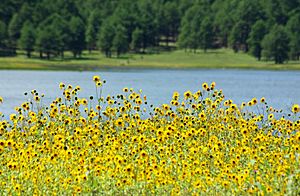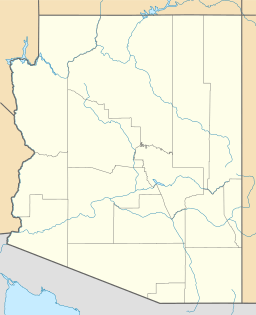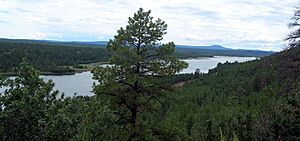Lake Mary (Arizona) facts for kids
Quick facts for kids Lake Mary |
|
|---|---|
| Location | Coconino County, Arizona |
| Coordinates | 35°4′22.1″N 111°31′27.2″W / 35.072806°N 111.524222°W |
| Type | reservoir |
| Primary inflows | Walnut Creek |
| Primary outflows | Walnut Creek |
| Basin countries | United States |
| Surface area | 600 acres (240 ha) |
| Average depth | 38 ft (12 m) |
| Surface elevation | 6,895 ft (2,102 m) |

Lake Mary is actually the name for two different reservoirs (or artificial lakes) in northern Arizona. They are located southeast of the city of Flagstaff. Sometimes, people use "Lake Mary" to talk about both lakes together.
These two lakes hold back the water from Walnut Creek. This creek doesn't always flow, which means it can sometimes dry up. The lakes are located upstream from Walnut Canyon. The fun activities and facilities at both lakes are managed by the Coconino National Forest.
Contents
What is Upper Lake Mary?
Upper Lake Mary is the lake furthest upstream, meaning it's higher up the creek. It was created by a small dirt dam on Walnut Creek. In 1941, the city of Flagstaff built this second dam south of the original Lake Mary. This created Upper Lake Mary.
This lake is long and narrow. It can be about 5 miles (8 km) long and up to 2,000 feet (610 m) wide. During dry times, the lake gets smaller and narrower.
What Fish Live in Upper Lake Mary?
Upper Lake Mary is a great place for angling (fishing)! It has nine different kinds of fish. These include black crappie, bluegill, green sunfish, and channel catfish. You can also find bigger fish like northern pike and walleye.
Sometimes, people also catch largemouth bass, yellow bass, and yellow perch here. There are also smaller bait fish like golden shiners and fathead minnows in Upper Lake Mary.
What is Lower Lake Mary?
Lower Lake Mary is located right below Upper Lake Mary. It's the smaller of the two lakes and was built first. When there's a lot of rain, it can be about 3 miles (5 km) long. It fills the valley from its own small dirt dam all the way to the dam holding back Upper Lake Mary.
However, during dry seasons, Lower Lake Mary often dries up completely. The lake is named after Mary Riordan. She was the daughter of rich lumber owners who built the first dam in 1904. They built it to supply water to Flagstaff.
Fishing in Lower Lake Mary
Because Lower Lake Mary often dries up, it's not as popular for water sports as Upper Lake Mary. But when there's enough water, it's regularly stocked with rainbow trout. Any fish species found in Upper Lake Mary can also end up in Lower Lake Mary. This happens when Upper Lake Mary overflows into the lower lake.
What Animals Live Around Lake Mary?
Both lakes are home to many wild animals. You might see large animals like elk and deer near the water. The lakes also attract many different kinds of birds. These include the great blue heron and the majestic bald eagle.
During the warmer summer months, many people visit the area just to watch the birds. It's a popular spot for birdwatching.
 | Ernest Everett Just |
 | Mary Jackson |
 | Emmett Chappelle |
 | Marie Maynard Daly |




